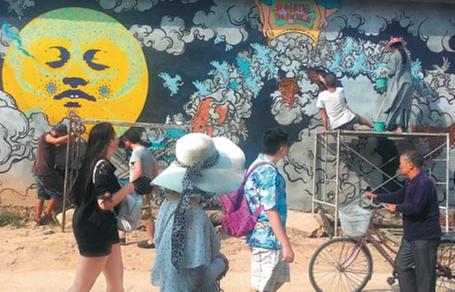Rural folks, rural strokes

 |
| A mural painting event in Xu village. [Photo provided to China Daily] |
The bookshop-that-was-once-a-temple is part of a rural development project initiated by Ou Ning, an artist and curator who moved to the village in 2011, keen to revive the countryside through culture and art.
Next to the bookshop is a coffee bar that used to be a cowshed, and several blocks away is an old rice store that is now a showroom displaying artisanal clothes and bamboo products.
Over the past few years the village, once inhabited mainly by the elderly and children, has attracted academics, architects, artists, designers, musicians and scholars from China and further afield, many of them invitees of Ou, to take part in activities including giving lectures or performances.
"There is a trend in China for urban elites, especially artists, to go to the countryside and help revive it, mostly culturally," says Li Huadong, an expert on rural development in China at the Beijing University of Technology.
From 2005 the central government began to strongly advocate rural revival as countless villages across the country lost a great chunk of their soul, the urban exodus leaving many of them with rump populations consisting mainly of elderly folk looking after their grandchildren. Artists such as Ou then decided to see whether they could create a prototype of how parts of rural China could reinvigorate themselves in novel ways.
"For these urban elites this was all very new," Li says. "In fact rural development lies very much at China's roots, but anyone who crosses a river needs to feel the stones."




































